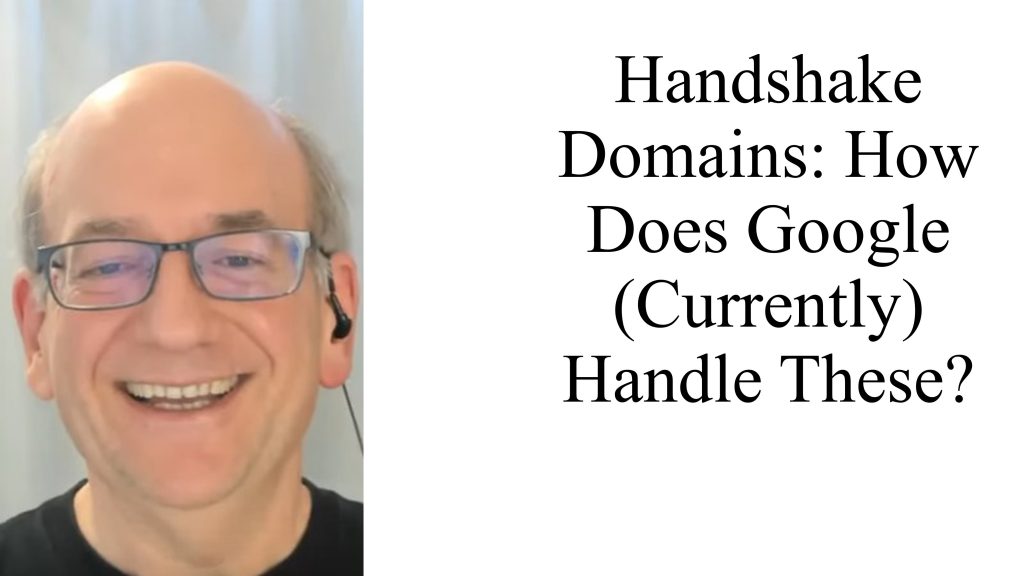
A handshake domain, from my brief research, is a domain that is owned forever (no annual rental fees), and, from a DNS (Domain Name System) perspective, it’s distributed across a blockchain arrangement.
Those are the two ways–at least that I know of–that a handshake domain name is different from a regular domain name.
So, how does Google handle these?
At the 46:04 timestamp of the English Google SEO Office-Hours From November 26, 2021, Google’s John Mueller (who seemingly wasn’t aware of what a handshake domain was), addressed a participant who asked about this.
Basically, to summarize the participant’s question was about indexing–how Google might index a handshake domain.
(The participant also gave detail on something he did and how long it took an HTML file to be indexed across a few different servers, but that’s beside the point here.)
John’s response was:
“So I think the aspect of indexing across different domains…we try to understand the overall context of a domain or of a website, and try to figure out like where does it make sense for us to invest our resources?
“And that can mean if we don’t know much about a domain, maybe it’ll take a little bit longer for us to start crawling and indexing stuff there.
“Whereas, if we already know that this is a really great website, then we’ll probably crawl and index a lot faster. So that’s, I think, kind of the aspect that you’re seeing there.”
“I think the other part with the handshake domains, I took a quick, I don’t know, five-minute look at what it was. So from what I can tell, it’s basically kind of like an alternate DNS system, which is kind of based on blockchain technology.
“And usually, what happens there is, on our side, our systems are essentially tuned to using kind of, I don’t know, the traditional DNS system, which for the most part works fairly well. So that’s kind of what we would focus on there.
“However, we do have, let’s say, an open mind, in general, at Google. And lots of people are playing around with all of the new technologies around blockchain as well.
“So I wouldn’t say that will never shift, but it’s probably not something that’s going to happen very quickly.
“And it’s, I think, similar to the onion domains. It’s kind of also an alternate DNS system. And that’s something where I think in the end we never indexed the onion domains directly.
“But if over time, we recognize that this is something that is very popular, that people are using this actually to host their content and make it accessible, then I could understand that our systems would be like, ‘Well, we have to figure out a way to deal with this and to index this content as well.’
“Because if people are searching for information, and that information is only findable through this way, then maybe we have to find a way to make that accessible. So from that point of view, if you need something short-term to work well in search, I would use the traditional DNS setup.
“If you kind of want to grow this, I don’t know, alternate setup, then I think that’s worthwhile trying out and kind of like keeping as more, I’d say, like a side project or something, to kind of try things out.
“And it could also be that there’s some kind of a middle ground there, in that since these are also still IP addresses that are hosted on the internet normally, maybe there is a way for almost like a gateway setup to help out there, so that we can still kind of crawl one side of URLs that lead to the final content.”
So, John said a lot.
Let me try to summarize:
So, that’s what I gather about handshake domains.